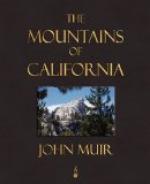others broken straight across, where some weakness
caused by fire had determined the spot. The gestures
of the various trees made a delightful study.
Young Sugar Pines, light and feathery as squirrel-tails,
were bowing almost to the ground; while the grand
old patriarchs, whose massive boles had been tried
in a hundred storms, waved solemnly above them, their
long, arching branches streaming fluently on the gale,
and every needle thrilling and ringing and shedding
off keen lances of light like a diamond. The Douglas
Spruces, with long sprays drawn out in level tresses,
and needles massed in a gray, shimmering glow, presented
a most striking appearance as they stood in bold relief
along the hilltops. The madronos in the dells,
with their red bark and large glossy leaves tilted
every way, reflected the sunshine in throbbing spangles
like those one so often sees on the rippled surface
of a glacier lake. But the Silver Pines were now
the most impressively beautiful of all. Colossal
spires 200 feet in height waved like supple golden-rods
chanting and bowing low as if in worship, while the
whole mass of their long, tremulous foliage was kindled
into one continuous blaze of white sun-fire.
The force of the gale was such that the most steadfast
monarch of them all rocked down to its roots with
a motion plainly perceptible when one leaned against
it. Nature was holding high festival, and every
fiber of the most rigid giants thrilled with glad
excitement.
I drifted on through the midst of this passionate
music and motion, across many a glen, from ridge to
ridge; often halting in the lee of a rock for shelter,
or to gaze and listen. Even when the grand anthem
had swelled to its highest pitch, I could distinctly
hear the varying tones of individual trees,—Spruce,
and Fir, and Pine, and leafless Oak,—and
even the infinitely gentle rustle of the withered grasses
at my feet. Each was expressing itself in its
own way,—singing its own song, and making
its own peculiar gestures,—manifesting a
richness of variety to be found in no other forest
I have yet seen. The coniferous woods of Canada,
and the Carolinas, and Florida, are made up of trees
that resemble one another about as nearly as blades
of grass, and grow close together in much the same
way. Coniferous trees, in general, seldom possess
individual character, such as is manifest among Oaks
and Elms. But the California forests are made
up of a greater number of distinct species than any
other in the world. And in them we find, not only
a marked differentiation into special groups, but
also a marked individuality in almost every tree,
giving rise to storm effects indescribably glorious.




